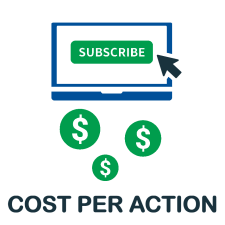CPA
Stands for "Cost Per Action."
CPA is a performance-based online advertising model where advertisers pay publishers a fixed amount whenever a user completes a specified action. Unlike other models that pay for clicks or impressions, CPA focuses on conversions. The user must not only click on an ad but also complete a predetermined action, such as making a purchase, filling out a form, or downloading an app.
For example, if a website visitor clicks an ad on a website, a click is recorded but not an action (or "conversion"). If the user takes the next step and completes a purchase, fills out a form, or downloads an app, the advertiser pays the publisher according to the agreed CPA rate. Generally, commissions for sales are higher than CPA rates for downloads and form submissions.
CPA vs Other Advertising Models
- CPA is often compared to CPL (Cost Per Lead), but while CPL specifically refers to generating leads (like form submissions), CPA is broader and can include any predefined action.
- CPA may be risker for publishers than CPC (Cost Per Click) or CPM (Cost Per Thousand Impressions) since payment is contingent on users completing the desired action, which may not always happen even if a user clicks an ad.
- CPA is considered more cost-effective for advertisers since they only pay for tangible outcomes, making it ideal for businesses focused on ROI (Return on Investment).
 Test Your Knowledge
Test Your Knowledge